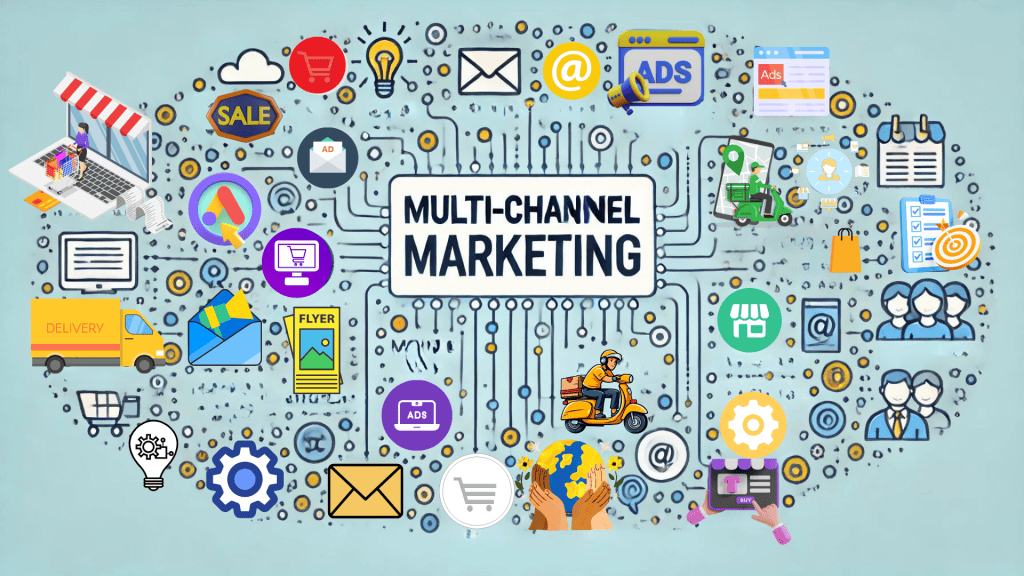Navigating The Challenges Of Multi-Channel Marketing
Reading time: 8 minutes
Table of Contents
- The Importance of Multi-Channel Marketing for Small Businesses
- Key Challenges in Multi-Channel Marketing
- 1. Maintaining Consistent Brand Messaging
- 2. Integrating Different Channels for a Unified Strategy
- 3. Managing Data Overload
- 4. Allocating Resources Efficiently
- 5. Adapting to Rapid Changes in the Digital Landscape
- Leveraging Tools and Expertise to Overcome Challenges
In today’s rapidly evolving digital landscape, multi-channel marketing has become a crucial strategy for small businesses seeking to expand their reach and engage with customers across various platforms. This approach allows businesses to be present on multiple touchpoints—whether through email, social media, content marketing, or paid ads—ensuring that they maximize their visibility and engagement. However, while multi-channel marketing offers significant advantages, it also presents unique challenges that businesses must address when navigating the challenges of marketing to ensure their efforts are successful.
In this article, we’ll explore the primary hurdles that small businesses face in multi-channel marketing and provide actionable solutions. We will also discuss how tools like marketing analytics software, hiring a marketing data analyst, and platforms like HubSpot can help small businesses navigate these challenges effectively. Additionally, we will explain how social media has impacted marketing for small businesses, and emphasize the importance of tracking influencer marketing KPIs and utilizing content marketing analytics for data-driven decisions.
The Importance of Multi-Channel Marketing for Small Businesses
Multi-channel marketing involves engaging with potential and existing customers through multiple platforms such as social media, email marketing, paid advertising, and content marketing. It’s no longer enough for businesses to rely on a single platform to build their brand or sell products. Customers expect to interact with businesses across different channels, and the benefits of digital marketing for small businesses are clear: increased visibility, better customer engagement, and improved conversion rates.
By employing a multi-channel marketing approach, small businesses can reach customers at various stages of their journey—whether they are discovering a new product, researching it, or ready to make a purchase. However, effectively managing and optimizing these channels is not without its challenges.

Key Challenges in Multi-Channel Marketing
1. Maintaining Consistent Brand Messaging
One of the most significant challenges in multi-channel marketing is ensuring that your brand’s message is consistent across all platforms. Each platform—whether it’s Facebook, Instagram, a blog, or email—has its unique environment and audience expectations, making it difficult to maintain a cohesive brand voice.
Maintaining consistency is essential because a disjointed message can confuse customers and weaken brand identity. This is where marketing analytics software and platforms like HubSpot come into play. By centralizing marketing efforts and data, these tools help ensure that your messaging remains aligned across all channels, even as you tailor it to fit the specific format and audience of each platform. Another critical component is how you manage interactions across channels—optimizing customer interactions with multi-channel management in CRM ensures that every touchpoint contributes to a cohesive and efficient customer experience.audience of each platform.
Working with a marketing analytics agency can further help small businesses refine their brand messaging strategy. The agency can analyze the performance of content across different channels using content marketing analytics and adjust the messaging accordingly to ensure it resonates with the target audience.

2. Integrating Different Channels for a Unified Strategy
Another critical challenge is integrating the various marketing channels into a unified strategy. Without proper integration, customers may experience a disjointed journey, which can lead to confusion and frustration. For example, a customer who interacts with a business via social media may have a completely different experience when they visit the company’s website or open an email from the brand.
To avoid this, businesses need to use marketing analytics software that enables them to synchronize efforts across all channels. This ensures that customers enjoy a seamless experience, no matter which touchpoint they interact with. HubSpot, for example, offers powerful integration features that centralize customer data and allow businesses to track interactions across platforms. This kind of tool is especially useful for tracking the performance of content across multiple channels using content marketing analytics.
Small businesses should also recognize the benefits of digital marketing for small businesses when it comes to integration. A unified approach not only improves the customer experience but also allows businesses to measure the overall impact of their efforts more effectively.
3. Managing Data Overload
One of the most daunting aspects of multi-channel marketing is the sheer volume of data generated from various sources. Whether it’s email open rates, social media engagement, website traffic, or influencer marketing metrics, businesses are often overwhelmed by the number of data points they need to track.
Without a clear strategy for managing and analyzing this data, it can be challenging to make informed decisions. Hiring a marketing data analyst can significantly improve how businesses handle data. A marketing data analyst can sift through large datasets, identify trends, and provide actionable insights that drive marketing strategies. By using content marketing analytics, they can determine which content resonates with audiences and which channels deliver the best results.
Moreover, businesses can use tools like HubSpot to manage and automate much of their data collection and analysis. These platforms make it easier to monitor performance and adjust strategies based on real-time data. For example, tracking influencer marketing KPIs through the platform helps businesses evaluate the effectiveness of their influencer campaigns and allocate resources accordingly.

4. Allocating Resources Efficiently
Effectively distributing resources—whether it’s budget, time, or personnel—across multiple marketing channels is another significant challenge. Each channel has its demands, and without careful planning, businesses can find themselves overspending on underperforming channels while neglecting more profitable ones. In many cases, these inefficiencies stem from deeper structural issues, such as the hurdles and challenges in CMS implementation projects, which can affect how content and campaigns are executed across channels.
This is where marketing analytics software and guidance from a marketing analytics agency can make a huge difference. These tools and experts can analyze performance data and help businesses determine which channels are delivering the best ROI. For example, if influencer marketing KPIs show that Instagram influencers are driving more sales than Facebook ads, it would make sense to allocate more resources to influencer marketing.
Additionally, platforms like HubSpot provide businesses with the flexibility to automate certain aspects of their marketing, freeing up resources for more strategic tasks.

5. Adapting to Rapid Changes in the Digital Landscape
The digital world is constantly evolving, and staying on top of new platforms, trends, and technologies can be overwhelming, especially for small businesses. Whether it’s new social media platforms, search algorithm updates, or changing consumer behaviors, businesses need to be agile and adapt quickly to these changes.
One of the most significant changes in recent years has been the impact of social media on marketing strategies. It’s important to explain how social media has impacted marketing for small businesses: platforms like Facebook, Instagram, and TikTok have transformed how businesses reach and engage with their audiences. Today, small businesses can connect with vast numbers of customers for a fraction of the cost of traditional advertising.
Using tools like marketing analytics software allows businesses to stay ahead of these changes by continuously monitoring trends and adjusting strategies accordingly. By tracking key metrics through content marketing analytics and influencer marketing KPIs, businesses can make data-driven decisions that help them stay competitive in an ever-evolving landscape.

Leveraging Tools and Expertise to Overcome Challenges
Overcoming the challenges of multi-channel marketing requires both the right tools and the right expertise. Here’s how small businesses can navigate these hurdles more effectively:
- HubSpot: This platform offers powerful automation tools that help businesses streamline their email and social media marketing efforts while maintaining consistent messaging across channels.
- Marketing Analytics Software: By centralizing data from multiple sources, marketing software makes it easier for businesses to track performance, manage resources, and optimize strategies.
- Marketing Data Analyst: Hiring a data analyst provides businesses with a more in-depth understanding of their marketing performance. These experts can help businesses make sense of complex data and offer strategic recommendations based on trends and KPIs, such as influencer marketing KPIs.
- Marketing Analytics Agency: Partnering with an agency can offer additional support in crafting and executing a comprehensive multi-channel marketing strategy.
In conclusion, while multi-channel marketing presents numerous challenges for small businesses, it also offers immense opportunities for growth. By addressing key issues like maintaining brand consistency, integrating channels, managing data, and staying adaptable, businesses can create a more effective marketing strategy. Tools like HubSpot and insights from content marketing analytics can play a pivotal role in ensuring that small businesses succeed in their marketing efforts.

By tackling these challenges head-on, small businesses can harness the power of multi-channel marketing to increase engagement, build customer loyalty, and drive long-term success. Discover the cutting-edge digital marketing solutions that Owltek Solutions offers and see how they can transform your online presence!
**This post contains affiliate links, meaning I may earn a small commission if you make a purchase through one of them. Rest assured, I only recommend products I truly love. Your support helps keep my creative business thriving — thank you!**
